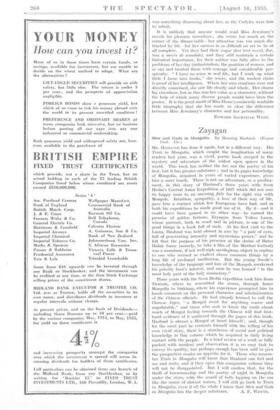Zayagan
Men and Gods in Mongolia. By Henning Haslund. (Kegan
' Paul. 5s.)
Mu. HASLUND has done it again, but in a different way. His Tents in Mongolia, which caught the imagination of many readers last year, was a vivid, poetic- book steeped in the mystery and adventure of the widest open spaces in the world. This book has neither the fire nor the poetry of his first, but it has greater substance ; and in'its pages knowledge of Mongolia, acquired in years of varied experience, giVes him a surer touch. There is not an' adventure, or a predica- ment, in this story of FIaslund's three years with Sven Hedin's Central Asian Expedition of 1927 which did not owe its happy issue to an unerring flair for the right way - with Mongols. Intuition, sympathy, a love ' of their• way, of life, gave him a contact which few Europeans have 'had, and in both his expeditions he made good use of it. • By it-L-anct it could have been gained in no other way—he earned the promise of golden fortune, Zayagan, from Yolros• Lama, whose portrait, both in word and 'in picture, is one of the good things in a book full of such. At his first visit to the Lama, Haslund was held almost in awe by " a pair of eye's, full of penetrating intensity and mysterious power," and he felt that the purpose of his presence at the shrine of Bater I lalak Some (namely, to take a film of the Maidari festival) was a mundane, if not well-nigh sacrilegious,' object to confess to one who seemed so exalted above common things by a long life of profound meditation. But the young Swede's knowledge of the language and lore of the Mongols awakened his priestly host's interest, and soon he was housed " in the most holy part of the holy monastery."
Three years with the Sven Hedin expedition took him from Tientsin, where he assembled the stores, through Inner Mongolia to Sinkiang, where his experience prompted him to harsh comment on the personal character and administration of the Chinese officials. He had already learned to call the Chinese Trgen, " a Mongol word for anything coarse and unpalatable," and those who seek to know the truth about much of Mongol feeling towards the Chinese will find first- hand evidence of it scattered through the pages of this book. Haslund is almost a Mongol at heart himself ; and, though for the most part he contents himself with the telling of his own vivid story, there is a storehouse of social and political knowledge in this volume which he acquired in daily living contact with the people. In d• brief review of a work so fully packed with incident and observation it is no easy task to Convey its quality, but perhaps enough has been said to give the prospective reader an appetite for it. • Those who remem- ber Tents in Mongolia will know that Haslund can feel and see and write, and if they open this companion volume they will not be disappointed. But I will confess that, for the thrill of horsemanship and the poetry of 'night in Mongolia under the stars,- With the sound of bells lapping on the ear like the music of distant waters, I will still go back to Tents in Mongolia, even if all the while I know 'that Men and GOds in Mongolia has the deeper substance. A. F. WilYTIL


































 Previous page
Previous page